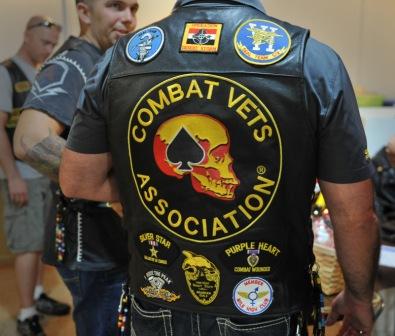Shouldn’t Combat Veterans Be Moved to Front of the VA Line?
 A common sight at the Sturgis Motorcycle Rally are the bikers who identify themselves as “combat” veterans, apparently in opposition to veterans who weren’t in harm’s way or who may never have left the US.
A common sight at the Sturgis Motorcycle Rally are the bikers who identify themselves as “combat” veterans, apparently in opposition to veterans who weren’t in harm’s way or who may never have left the US.
A friend of mine who served during the Korean War says that he spent the period “just chasing girls” stateside, with little sense as a teen of either patriotism or abstractions about duty. He is surprised that veterans are all swept up into a “one size fits all” category in the media, as if all veterans faced the dangers and hardships of frontline combat. “Veterans with medals for bravery or Purple Hearts should be special,” he says.
 US Marine E. B. Sledge, author of With the Old Breed at Peleliu and Okinawa, was very much aware of how double standards can be unfair: “To me, there were two different wars. There was the war of the guy on the front lines. You don’t come off until you are wounded or killed. Or, if lucky, relieved. Then there was the support personnel. In the Pacific, for every rifleman on the front lines there were nineteen people in the back. Their view of the war was different than mine. The man up front puts his life on the line day after day to the point of utter hopelessness.”
US Marine E. B. Sledge, author of With the Old Breed at Peleliu and Okinawa, was very much aware of how double standards can be unfair: “To me, there were two different wars. There was the war of the guy on the front lines. You don’t come off until you are wounded or killed. Or, if lucky, relieved. Then there was the support personnel. In the Pacific, for every rifleman on the front lines there were nineteen people in the back. Their view of the war was different than mine. The man up front puts his life on the line day after day to the point of utter hopelessness.”
During the Vietnam War, two-year draftees were immediately put into the infantry, then quickly shipped out for combat duty in the war. Casualties came from this group. Others, the “smarter” ones, signed up for one extra year so they could pick a job, such as office clerk, that would keep them rear echelon even if they were sent overseas. Shouldn’t the health care needs of those injured in combat be moved to the front of the line?
As was noted in an earlier post, “VA hospitals made sense after a catastrophic war, such as World War II, when combat injuries tended to overwhelm what was available.” But the government and mainstream media today prefer to see all veterans as equal, with the shield of political correctness permitting no discussion.
What’s really important is the management and dispersal of huge amounts of taxpayer money. During a recent workshop for veterans on “veterans benefits,” one lady from Social Security greeted the audience with “you are all heroes.” Simply for having served in any capacity or length of time. But aren’t the real heroes those who earn bravery medals, in combat?
“So why the lifelong entitlement to free medical care in later years?” for those who aren’t combat disabled, the same post asks about the VA system. But unlike the National Health Service in Britain, the US government’s efforts seem piecemeal and shaky, a hodgepodge of different intrusions that can be confusing (and expensive) to the consumer. Veterans seeking healthcare benefits from the VA today, however, know that they won’t get far if personal incomes aren’t near poverty level or if they aren’t disabled, combat or otherwise.
 A common sight at the Sturgis Motorcycle Rally are the bikers who identify themselves as “combat” veterans, apparently in opposition to veterans who weren’t in harm’s way or who may never have left the US.
A common sight at the Sturgis Motorcycle Rally are the bikers who identify themselves as “combat” veterans, apparently in opposition to veterans who weren’t in harm’s way or who may never have left the US. US Marine E. B. Sledge, author of With the Old Breed at Peleliu and Okinawa, was very much aware of how double standards can be unfair: “To me, there were two different wars. There was the war of the guy on the front lines. You don’t come off until you are wounded or killed. Or, if lucky, relieved. Then there was the support personnel. In the Pacific, for every rifleman on the front lines there were nineteen people in the back. Their view of the war was different than mine. The man up front puts his life on the line day after day to the point of utter hopelessness.”
US Marine E. B. Sledge, author of With the Old Breed at Peleliu and Okinawa, was very much aware of how double standards can be unfair: “To me, there were two different wars. There was the war of the guy on the front lines. You don’t come off until you are wounded or killed. Or, if lucky, relieved. Then there was the support personnel. In the Pacific, for every rifleman on the front lines there were nineteen people in the back. Their view of the war was different than mine. The man up front puts his life on the line day after day to the point of utter hopelessness.”
This could easily be a two sided conversation. a) The services need support personnel. b)A professional chef, for example, could provide far greater service as a chef than as an infantryman. c) Unless fulfilling an enlistment requirement, the services will determine where you are most needed.
I say this having served in Vietnam from 68′- 70′ in various infantry specialized positions. I chose those positions and was lucky.
Although the article and above comment have merit, the opportunity to quantify someone elses experience and make a determination is a slippery slope. I’ve got medals, I don’t need a Purple Heart thanks and consider myself fortunate to have avoided that medal. But don’t tell me that makes me any different than anyone else who has been there/done that.
I served as an Infantryman and Squad Leader with the U.S. Army; 4th I.D.; 2/8th Inf.; Republic of Vietnam 1969-1970. I agree with the proposition that combat veterans should receive enhanced and preferential veterans benefits over non-combat veterans. From what statistics that I’ve seen, those that were actually in combat in Vietnam, Infantry and others, had about 10% chance of being K.I.A. and about a 50% chance of being Wounded in Action. Together with the same is the extreme hardship, both mental and physical, associated with exposure to the combat situation. Simple justice requires special treatment by the VA and US Government for our Armed Forces Combat veterans.